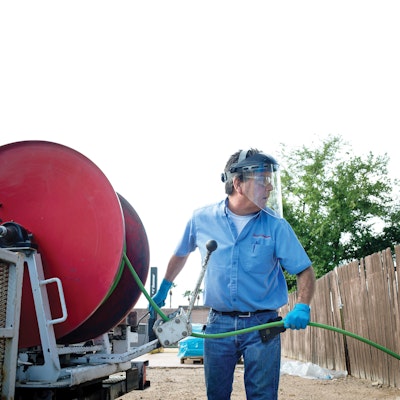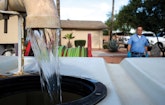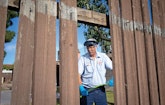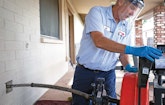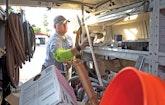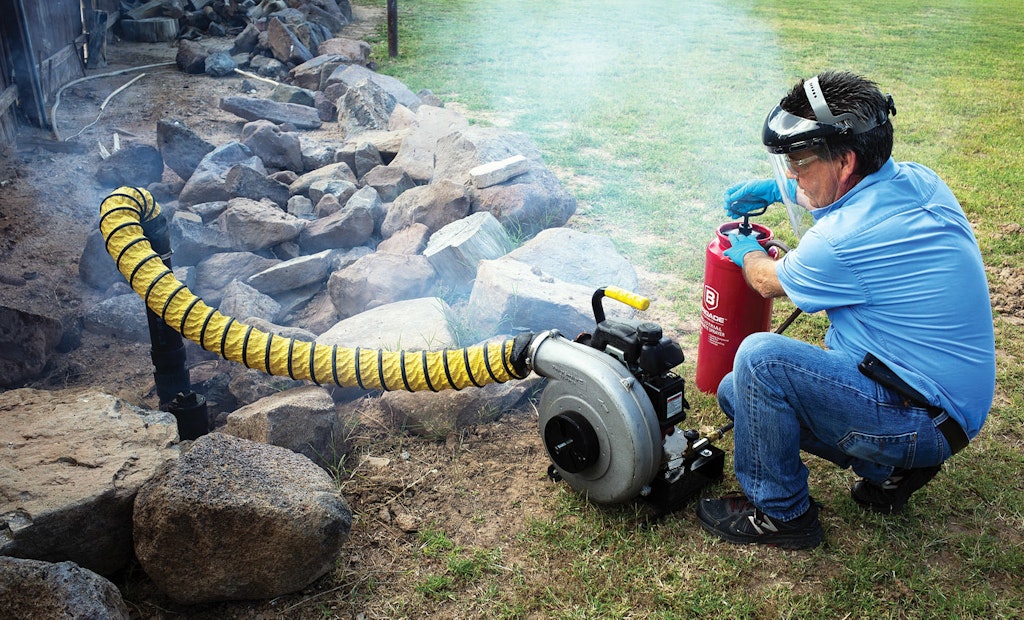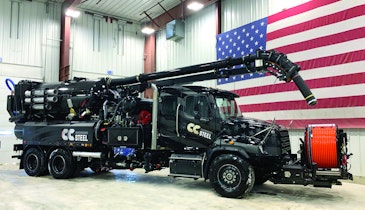Interested in Plumbing?
Get Plumbing articles, news and videos right in your inbox! Sign up now.
Plumbing + Get AlertsThere was a time when plumbing services were considered important, but not given much thought by the average person. Then the coronavirus came along and the plumbing trade rose higher in public esteem and was designated an essential business.
The new status didn’t surprise Audrey Monell, owner and president of Forrest Anderson Plumbing and Air Conditioning in the Phoenix metropolitan area. After all, Monell grew up in the industry: first sweeping floors and then, as a teenager, helping keep the books and going out on service calls. By the time she graduated from Arizona State University with a degree in economics, Monell was persuaded that leading a third-generation plumbing company was a good career choice, and she began doing just that in 2008.
As April 2020 got underway and the U.S. settled into a second month of pandemic disruption, workdays at Forrest Anderson were pretty much business as usual, according to Monell.
“Until Monday of this week, people were still calling with routine maintenance requests. They were stuck at home with nothing else to do. But in the last few days, all the service calls are about emergency situations.” She added that the shop at that point was experiencing “a little bit of a pullback in commercial work, mostly because some of our commercial customers have shut their doors or reduced their hours.”
Spring usually is a time for the company to beef up service crews as temperatures begin to routinely climb into the mid-80s and homeowners and businesspeople start turning on their air conditioners. That didn’t happen this spring.
“Just like any other normal year, before the virus hit hard, we were getting more people on staff. Then all of a sudden we didn’t have work for them so we stopped hiring,” she says. Though new people were not being brought aboard in April, Monell had no intentions of letting employees go. Layoffs are not in the Forrest Anderson playbook.
“We’re keeping everybody on. Our guys know if they need anything, we’re here for them. They know that they still will have a job no matter what,” she says. “I was thinking earlier today about the true character of a company, which shows itself when people are scared but everyone pulls together.”
Steady work
Air conditioning work may have dropped off this spring, but cleaning drains is not temperature dependent. Clogs occur year-round, and the company’s drain cleaning work remained steady. It constitutes about 15% of Forrest Anderson’s service calls, which Monell calls “a decent amount, especially considering we compete with companies whose primary service is drain cleaning.”
An “uptick” in such work occurred a couple of years ago after the company invested in a CCTV camera system for inspecting the lines, having previously subbed out such work. Employing the RIDGID SeeSnake M200 camera system with a CS10 monitor obviously gave Forrest Anderson new in-house diagnostic capacity. As important, Monell says, was that the visual system cemented relationships with customers. Seeing is believing, after all.
In most cases, obstructions are cleared away using a General Pipe Cleaners Super-Vee drain cleaner, which worms its way through a clog to collapse and clear it. If the barrier resists that approach, one of two Spartan Tool jetters is rolled out to blast it apart. Each plumber at Forrest Anderson is trained to eliminate blockages from drains discovered on routine calls, with a Super-Vee on each truck and a Spartan jetter available in the shop.
Procrastination being a fundamental human condition, most people call for drain cleaning services only after allowing grease or some other coagulant to reach a critical mass and begin to slow or back up flow in a pipe, Monell says. “Most of our customers ignore the situation until it is fully clogged, but we do get people who are looking into buying a house and want an inspection. They pay for their own camera work. Checking drainpipes is a very, very important thing for a potential homeowner to do.”
High demand
Everyone who cleans out a drain has a favorite story of what was found wedged inside the pipe. Monell’s involves tree roots. “It was a commercial stoppage, and the entire pipe was filled with a root of a big tree. Surprisingly, the pipe still was functioning, more or less.”
Trees planted along the path of a drainline is a pet peeve for Monell. She runs into it too often. “When people plant trees in the front yard, they plant them right over where the pipe is buried.” Roots then find their way into the pipe and problems begin.
More often, it’s human behavior that contributes to the recurring problem. “I definitely believe the drain cleaning part of our business will only grow. People will keep on putting the wrong things down the toilet. That never will stop.”
As COVID-19 spread across the country, some predicted that the toilet-paper craze would bring new business to plumbers, with toilet-paperless people using and flushing unsuitable paper products down the toilet. “Oh, yes, that was a problem before and it has worsened,” Monell says. “We have had to explain that paper towels are not a good replacement for toilet paper because they don’t dissolve as well. Baby wipes also don’t belong in a toilet.”
People’s actions in the kitchen during the pandemic are to blame as well, Monell says. “It’s kind of funny. A lot of people are home and working from home. They’re bored and spending a lot more time in the kitchen. There’s a lot more stuff than before going down the disposal. Stoppages of all kinds have increased.”
Monell is also expecting to see more customer demand for a product called an air scrubber. It is affixed to cooling and heating units and attaches germ- and virus-fighting molecules to infused air entering a home or office. Suddenly, such disinfecting devices seem like a good idea.
Enduring hard times
Monell’s grandfather started the plumbing company in Indiana, eventually moving the business bearing his name to Arizona, where Monell’s father, Don Hensley, became the second-generation owner of the family firm. As disruptive to the normal business routine as the COVID-19 epidemic has been, it is not the first leadership challenge Monell has faced since taking over in 2008. That was the year a deep national recession took hold, one that especially challenged the construction trades, including plumbing.
During the recession, the staff of Forrest Anderson was halved through attrition as employees voluntarily left for other states and jobs. No one was laid off then either, and the company subsequently returned to its full staff level of 27 people. It operates today with an annual revenue of $5 million. That earlier harrowing economic experience undoubtedly helped shape both the company and its president. Monell has been named one of the Most Influential Women in Arizona Business and is president of the Phoenix Chapter of Executive Women International.
In April, as the wrenching economic impact of COVID-19 spread, Monell expressed concern for other firms in the plumbing industry. “I know some smaller businesses are shutting their doors just to avoid having to pay things like sick leave. They just cannot afford that out of pocket. Small companies that are not prepared and don’t have good relationships with vendors and financial people are at risk of being put out of business.”
Monell believes openness is the answer for small businesses having to endure such financial trials. “During hard times, it’s a good idea for owners to be transparent — about labor laws, about how they see the workflow going in the near future. To be completely honest with everyone is vital. I’ve seen other companies where employees were unclear about what was going on and they bailed. Our guys know we will get through a bad time because we all are in this for the long haul.”
The 36-year-old executive looks back at her dozen years at the helm of Forrest Anderson and is heartened by what she’s learned about crises and the response of her colleagues during such episodes. “Basically, the hardest times can sometimes be the most rewarding. In times like these, you get to see everybody in the worst possible situation and see how they deal with it, how they sort it out. It’s so nice to know that we all have each other’s backs.”
Customer education is key
A toilet is a receptacle. What too many people fail to understand is that a toilet is not a trash can. Anything flushed that was not designed to be is problematic.
Despite the fact that Forrest Anderson Plumbing and Air Conditioning benefits from service calls in the Phoenix metropolitan area when toilets become plugged, the company quietly campaigns on its website against disposing of inappropriate stuff in toilets: “Waste and toilet paper, people. Waste and toilet paper.”
The company’s public service campaign against toilet trashing has been extended to public TV. Mark Stevens, Forrest Anderson employee, or Audrey Monell, company president, have appeared on a live morning show on Phoenix television station AZTV to talk about it. Using a dolly-mounted porcelain toilet and tank, they demonstrate where to turn off the water if a plugged toilet is overflowing and how to properly use a plunger to clear away a blockage.
The portable toilet appearances are timed for Super Bowl weekends or in advance of Thanksgiving, annual events that trigger lots of partying, eating and attendant stuff. The message to 1.9 million AZTV holiday viewers: Don’t take it out on your toilet.
Besides covering the subject in the website’s blog and other content spaces, Monell says company techs regularly talk to customers in the course of unstopping their toilets. The counsel to customers includes having a wastebasket next to a toilet in the bathroom so that nonflushables have a receptacle of their own.
